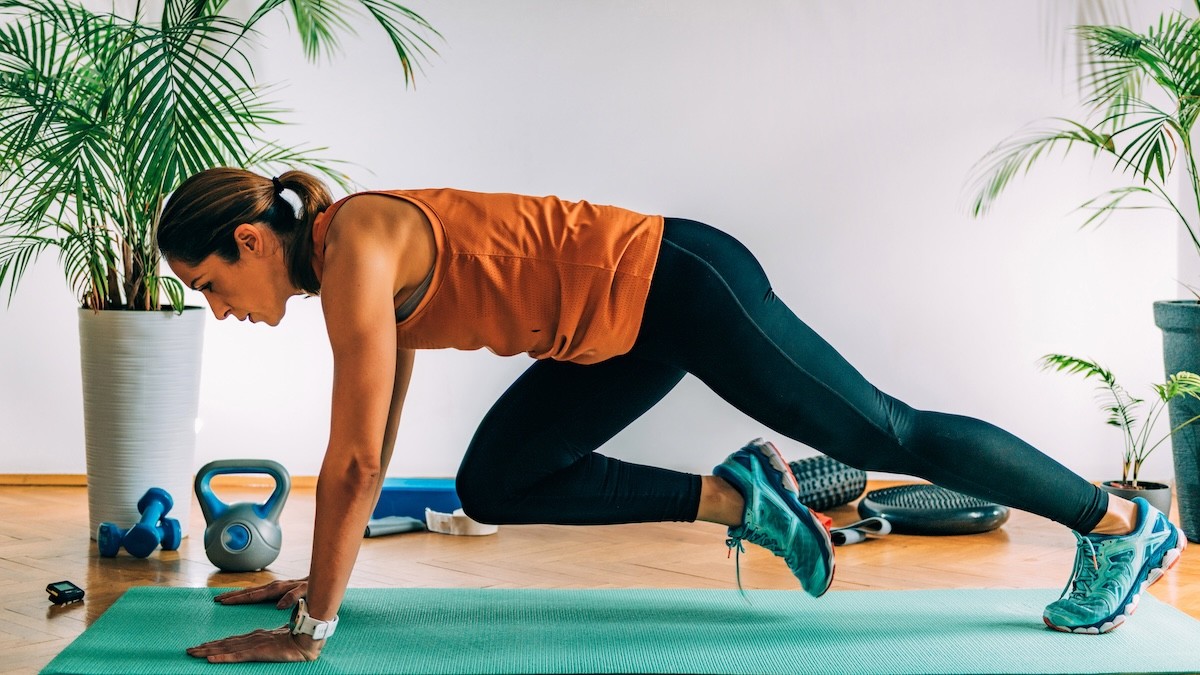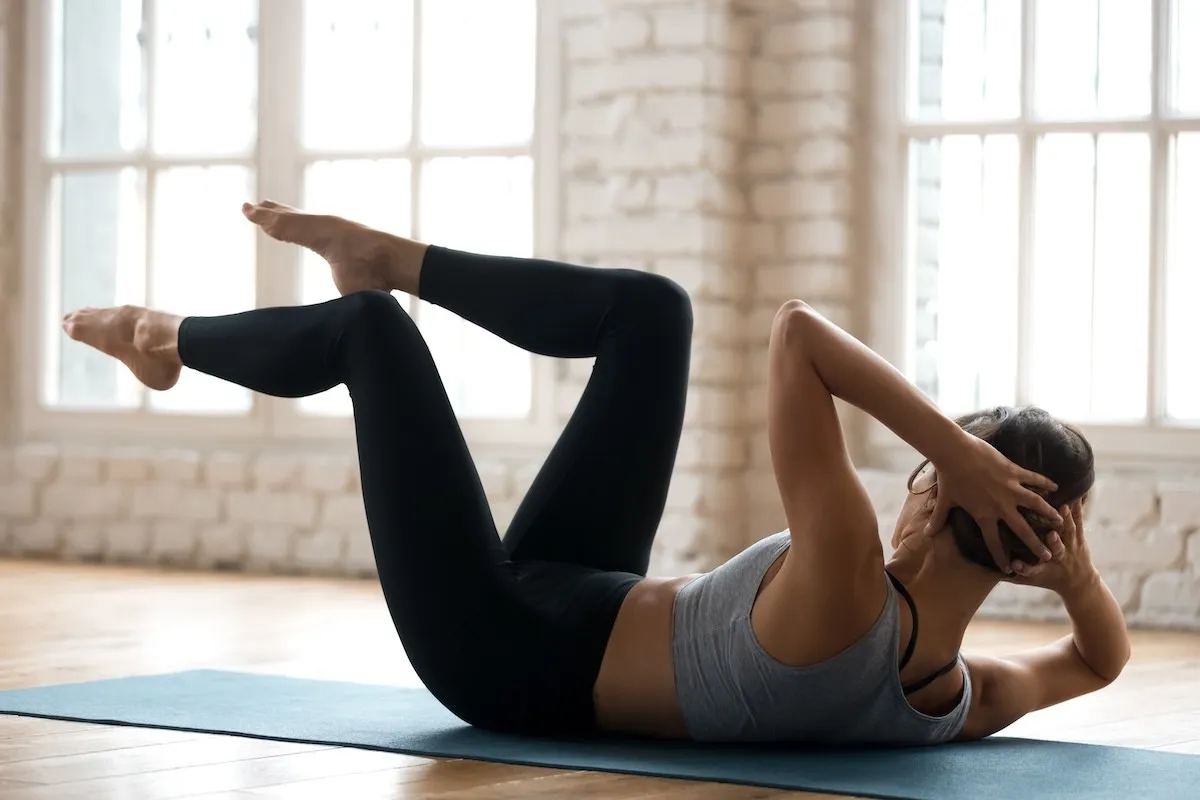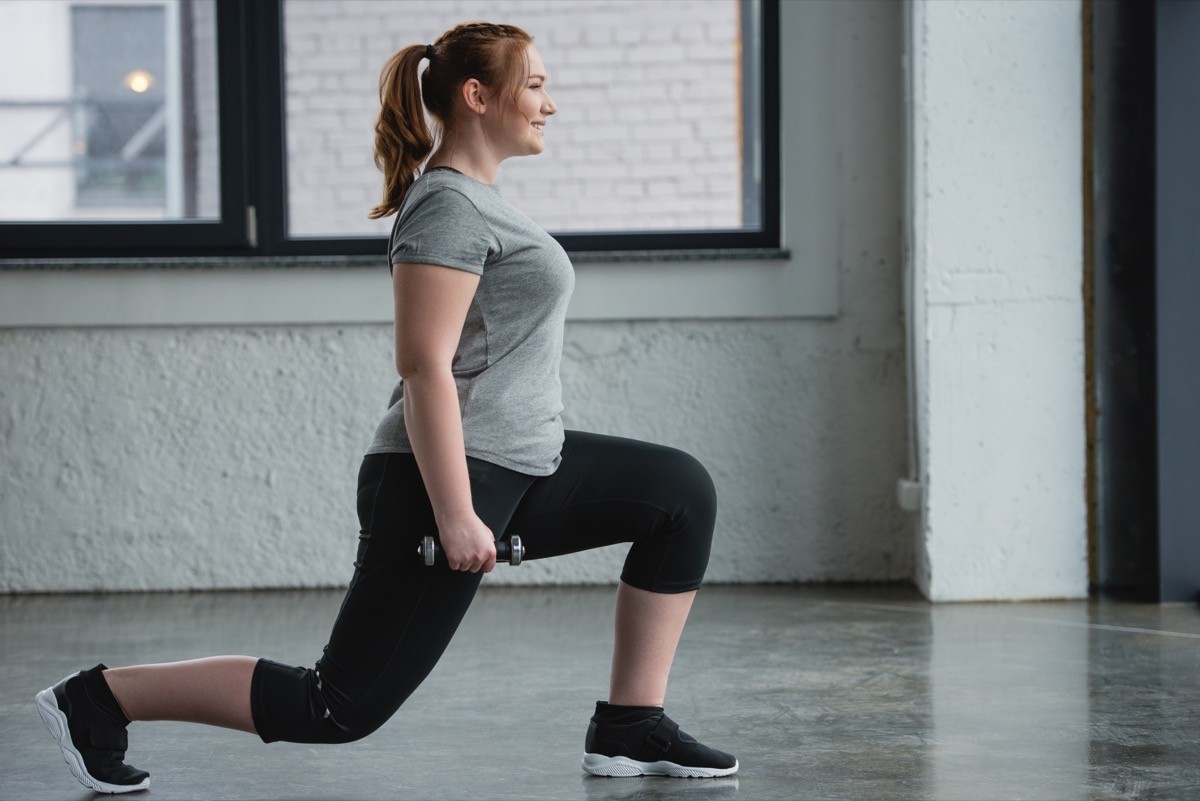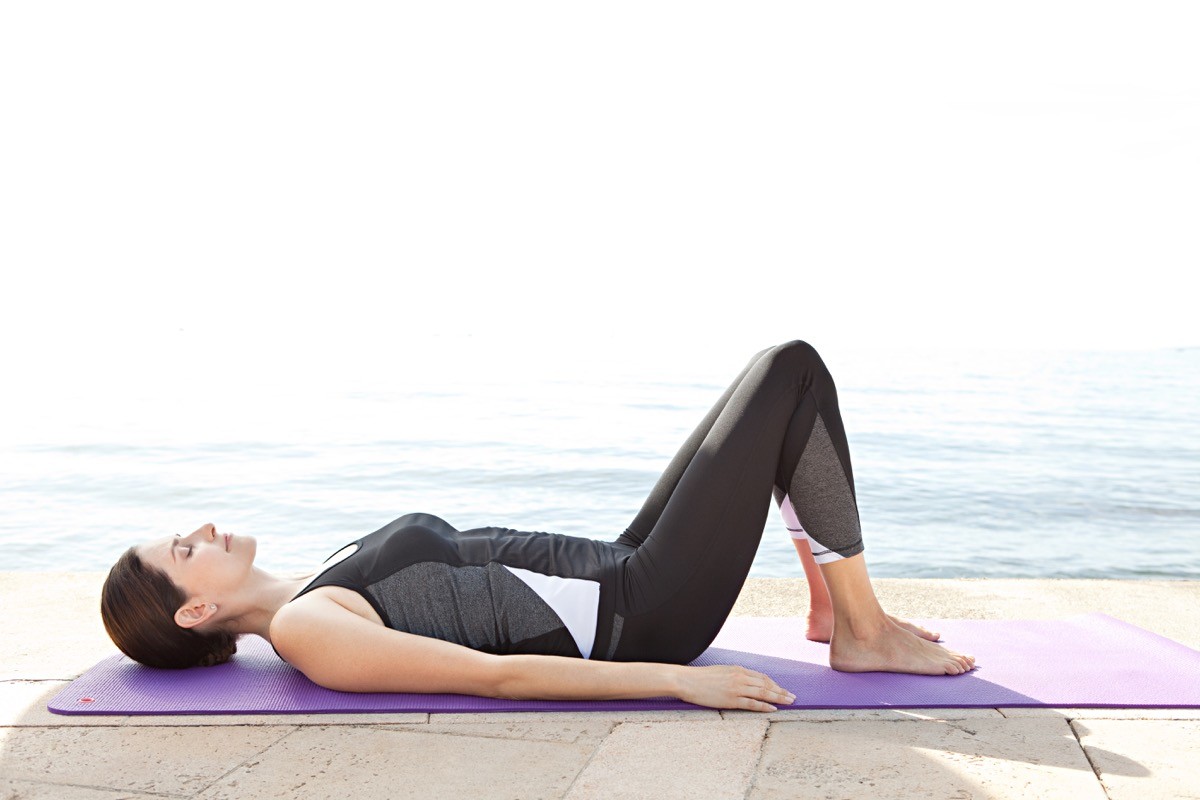4 Workouts That Target Belly Fat and Torch Calories—No Crunches Required

If you feel like you’ve dedicated hours and hours of your life to crunches and sit-ups, and you’re still waiting to see the results, this article is for you. Unlike achieving toned arms or a tight booty, getting a flat stomach takes a lot more than a handful of targeted exercises. This is because the belly is one of the most common places to accumulate excess weight, and it’s also one of the hardest body parts to shed fat.
“When people want to lose belly fat, the first thing that comes to their minds is doing more cardio or crunches,” shares Will Duru, personal trainer and founder at 12reps. “It’s easy to think that you can just do 30 minutes of cardio and four sets of sit-ups and you’ll lose stomach fat, but it doesn’t work like that because by doing sit-ups, you’re just pushing the fat down and making your waist thicker.”
Elyse Familant, health coach and yoga instructor at Living in the Light Wellness, agrees that “spot reduction is a myth.”
“However, if someone seriously wants ‘abs’ and is willing to commit to a multi-pronged approach, meaning eating healthy, cardio, strength, and core work, they will see results,” Familant explains. “It’s about losing fat overall and building strength underneath. When the fat melts away, the toned midsection will emerge.”
With that in mind, we picked the brains of fitness pros to put together a list of the best exercises that target belly fat and torch calories—no crunches or sit-ups required.
RELATED: 10 Best Ways to Strip Away Your Unhealthiest Belly Fat, According to Doctors.
1
HIIT Circuit

There’s long been a debate about whether cardio or strength is better to get abs, but according to Josh York, CPT, founder of GYMGUYZ, “In order to target belly fat effectively, it’s important to rotate through workouts that target core muscles while burning calories.”
“High Intensity Interval Training (HIIT) is an effective way to target belly fat as the short bursts of intense exercise elevate heart rate, burn calories, and speed up metabolism,” he explains. “What is unique about HIIT is the excess post-exercise oxygen consumption, so your body continues to burn calories after the workout.”
York suggests creating different HIIT sequences that you can rotate through during the week. Not only does this keep your muscles guessing and working hard, but it prevents you from getting bored with your workout. Here are the top exercises for a HIIT circuit:
1. Burpees
A lot of people get intimidated when they hear the word “burpees,” but this is a full-body exercise that combines cardio and strength.
“Start standing up with your hands by your head, jump up, then down into a frog position, then extend your legs back into a push-up position,” York explains. “For an advanced workout, incorporate a push-up before jumping back into the frog position, then jump back up into the air with your hands up.”
“For a good HIIT rotation, try to do as many burpees as possible, maintaining proper form, for 30 seconds to one minute with 10 to 15 seconds of rest in between sets,” he recommends.
2. Squat jumps
This exercise isn’t only for booty-building. “Squat jumps are a great way to engage the core and target belly fat, as they burn a large amount of calories and specifically target the core, as this exercise requires a lot of stability,” York notes.
“Start with your feet shoulder-width apart and hands either behind your head or out in front of you for stability. Jump straight up before landing and immediately moving into a squat,” he details. “From the squat, engage your core and legs to propel yourself straight up into a jump.”
“Again, for this workout, try to do as many squat jumps as possible for 30 seconds to one minute with 10 to 15 seconds of rest in between sets,” he says.
3. Sprint intervals
If you have access to a treadmill or are doing your HIIT circuit outside, incorporating sprint intervals “burns calories, boosts metabolism, improves insulin sensitivity, and helps to break down fat storage,” York points out.
“Start with a 5-minute walking warm-up, then sprint for 30 seconds, with a 1-minute walk following,” he suggests. “Repeat the 30-second sprint with a 1-minute walk 3-5 times for the most effective workout.”
4. Russian twists
This core-focused exercise targets your entire midsection, including your obliques (where those pesky love handles form).
“Sitting on the ground, bring your knees up towards your chest, then rotate your upper body to either side, keeping your lower body as still as possible,” York instructs. “Engaging your core helps to maintain stability when completing this move.”
To make this exercise easier, you can keep your feet on the ground with your legs bent. Or, to up the intensity, hold weights while you twist.
“For an effective rotation, complete Russian Twists for 30 seconds to one minute with 10 to 15 seconds of rest between sets,” York advises.
5. Mountain climbers
Baltazar Villanueva, personal trainer and nutrition coach at Relentless Spirit Personal Training & Nutrition, agrees that HIIT is the way to go to lose belly fat. One of his favorite moves for a circuit is mountain climbers: “This dynamic move combines core engagement with cardio, helping to spike your heart rate while targeting your abs, shoulders, and legs.”
“Start in a high plank position and alternate driving your knees toward your chest as fast as you can while keeping your core tight,” he says. If you need to slow this move down, you can simply drive one knee in at a time, instead of in a running motion.
6. Kettlebell swings
Next, Villanueva recommends kettlebell swings.
“This full-body exercise engages your glutes, hips, and core while also challenging your cardiovascular system,” he says. “The explosive hip hinge motion helps you burn calories quickly and strengthens the posterior chain, which supports overall posture and core stability.”
RELATED: Eating These 12 Foods Can Burn Belly Fat Fast, Nutritionists Say.
2
Pilates Sequence

Pilates’ benefits include everything from improved posture to increased flexibility. Of course, it also strengthens core muscles. As Peloton explains, “Pilates moves work not only the rectus abdominis (aka six-pack muscles) but also your entire powerhouse, including your:
- Transverse abdominis (deep core)
- Diaphragm
- Rotators
- Multifidus (core stabilizer)
- Quadratus lumborum (deepest back muscle)
- Pelvic floor“
According to fitness experts, these are some of the most effective Pilates exercises:
1. Pilates roll-up
Familant says this exercise works the entire torso, including the upper and lower abs, back, and deep core muscles: “Unlike a crunch, the roll-up builds strength through the full range of motion and also improves spinal flexibility, which is a huge bonus for overall health and wellbeing.”
“Lying down with arms overhead, as you exhale, you slowly peel up one vertebra at a time into a seated position, inhale, stay, and then exhale as you slowly lower back down,” she explains.
2. Pilates roll-back with oblique twist
“This move strengthens the rectus abdominis and obliques while helping to build control and core endurance,” Familant notes.
“You start seated, with knees bent and feet on the floor,” she instructs. “On the exhale, you roll back, leading with your lower back. At the same time, you reach your right arm out and turn the upper body to the right. On the inhale, you roll back to center, then repeat on the left.”
3. Pilates crisscross
You might know this exercise as a bicycle, which Andrea Lepcio, founder and owner of Mighty Fit, recommends to lose belly fat.
“Lie supine. Place your hand over your hand behind your head with your elbows wide,” she instructs. “Inhale and engage your core to lift your head and shoulders as high as you can. Exhale and swing the opposite elbow to the opposite knee. Inhale in between, staying as high as you can. Repeat 8-12 per side.”
4. Bird dog
In addition to strengthening the core, Peloton instructor Denis Morton said in an article that the bird dog helps with stability, balance, and coordination.
“Because while you are load bearing, a lot of the load is borne by your knee and your hip, which are really strong to begin with,” he explained. “So you’re not challenging the muscles that are holding you off the ground in the same way that you would with something like a sit-up where you’re lifting the entire weight of your torso and head off the ground with just one small muscle group.”
To get started with this exercise, “Come to an all 4’s position with hands under your shoulders and knees under your hips. Engage your core, lengthening your spine. Your neck is in line with your spine as you look down,” says Lepcio, who breaks down three variations of the move:
- Reach your left arm and right leg, keeping your core still. Switch sides.
- Reach your left arm and right leg, keeping your core still, on an inhale. Exhale and draw your right knee to your left elbow. Repeat the same side 8-12 times each.
- Keep both hands on the ground. Engage your core and elevate your right leg. Swing your leg side to side like a grandfather clock 8-12 times. Repeat on the second side.
4. Planks
Villanueva is a fan of plank variations, including plank shoulder taps and side planks: “They challenge your entire midsection, including the deep core muscles that traditional crunches often miss. Holding proper plank form while incorporating movement requires stability, coordination, and sustained core engagement.”
To get started in proper plank form, Lepcio explains: “Lengthen your body face down on your full arms or forearms. Draw your shoulders back and down, engage your core and your glutes, keep your hips level with your shoulders, and come up on your toes.”
5. Leg drops
This controlled movement specifically targets your lower abs and hip muscles, building deep core strength that contributes to overall belly fat loss as well as improving core stability,” shares Trond Nyland, functional fitness advocate and CEO and owner of Fynd.”
“Lie on your back with your extended legs lifted and your arms at the sides,” he explains. “Slowly lower legs toward the floor but not touching, and then return to the beginning position with your lower back still pressed into the floor. Do 1-3 sets of 10-16 repetitions.”
RELATED: 7 Easy Wall Pilates Exercises That’ll Tone Your Core in No Time.
3
Standing Core Workout

According to Peloton instructor Rebecca Kennedy, “standing core is the most functional way to train your core.”
“Any time you transition movements to different planes of motion, you recruit more muscle groups and open up to new variables like stability, balance, posture, and weight transfer,” she explained in a Peloton article. “Let’s also not forget that when we bring core bracing, breathwork, and pelvic floor engagement from a supine position to standing, it magnifies its potency.”
And the experts with whom we spoke agree, recommending the following standing core exercises to target belly fat:
1. Standing dumbbell knee lifts
“This is one of my favorites because it’s so functional, accessible, and effective,” shares Familant.
“Holding light weights overhead, alternate lifting knees and bring weights down to the knee that is lifted,” she advises. “It engages the core dynamically while also working balance and coordination. Extra bonus—it gets your heart rate up, too.”
2. Wood chopper
This one requires a little coordination (and probably a few practice rounds), but once you get it down, it’s a great core burner.
“Stand legs as wide apart as is comfortable. Bend both knees and tap your left foot with your right hand. Stand up and rotate, reaching your right arm behind you, following your hand with your eyes,” explains Lepcio. “Repeat 8-12 per side. You can do it with nothing in your hands, using a resistance band, a dumbbell, or a medicine ball.”
3. Ceiling circles
This exercise focuses on a full range of motion, engaging a wider swath of your core.
“Stand tall. Lift your arms up and over your head, keeping your shoulders away from your ears,” instructs Lepcio. “Hinging at the hip, you are going to draw a circle on the ceiling by taking your body forward to the left, back, to the right, and back to forward.”
“You can do 6 one way or change sides each time,” she adds. “As you get stronger, you can add a resistance band, medicine ball, or dumbbell in your hands.”
4. Lunges
Lunges don’t just target your quads and glutes; they also force you to engage your core.
“They assist in building lean muscle, enhancing balance and stability, and increasing your metabolism so you continue to burn fat even after your workout is over,” says Nyland, who recommends completing 2-3 sets of 8-12 reps for both legs.
RELATED: 10 Best Supplements for Weight Loss, Doctors Say.
4
Core awakening trio

Melody Morton-Buckleair, founder of The Good Space Pilates in Houston and Elmwood Place Pilates in East Texas, says, “Breath is your internal fat burner.”
“Exhale-driven movement oxygenates tissue, supports lymph flow, and resets the nervous system—a key to sustainable fat loss,” she explains.
With that in mind, she teaches a sequence called the “Core Awakening Trio” in her classes—”no equipment needed, just breath and body awareness:
1. Breath-Focused Pelvic Tilt (Supine)
Lie on your back, knees bent, feet flat. On your exhale, gently draw your belly button toward your spine as you imprint the low back.
Do 10–12 slow reps with long, full exhales.
Why it works: This ignites your transverse abdominis—the deep corset muscle responsible for real core control and a flatter belly.
2. All-Fours Belly Lift (a.k.a. Cowgirl Hover)
From hands and knees, float your knees 1 inch off the floor while exhaling and pulling your belly up and in. Hold for 5 seconds.
Repeat 5–8x.
Why it works: It fires the whole front body chain and resets the connection between breath, pelvic floor, and core—especially powerful for post-40 bodies.
3. Standing Exhale Pulses
Stand tall, exhale sharply through pursed lips while wrapping your abdominals in and up (like cinching a belt).
Do 10 short exhales in a row.”